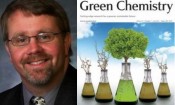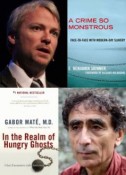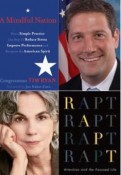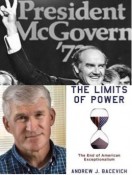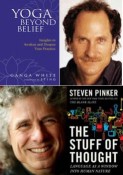Free Forum Q&A – JOHN WARNER One of the founders of Green Chemistry Can we have progress without pollution?
Written on April 30th, 2015(Originally aired November 2010)
According to Scientific American, “Experts guesstimate that about 50,000 chemicals are used in U.S. consumer products and industrial processes. Why the uncertainty? The 1976 Toxic Substances Control Act does not require chemicals to be registered or proven safe before use. Because the Environmental Protection Agency must show, after the fact, that a substance is dangerous, it has managed to require testing of only about 300 substances that have been in circulation for decades. It has restricted applications of five.” The harmful side effects of chemicals have long been tolerated in the US as a price of progress and profits.
But in the early 1990s a small group of scientists began to think differently. Why, they asked, do we rely on hazardous substances for so many manufacturing processes? After all, chemical reactions happen continuously in nature, thousands of them within our own bodies, without any nasty by-products. Maybe, these scientists concluded, the problem was that chemists are not trained to think about the impacts of their inventions. Perhaps chemistry was toxic simply because no one had tried to make it otherwise. They called this new philosophy “green chemistry.”
J0HN WARNER and Paul Anastas are the founders of green chemistry and co-authors of Green Chemistry: Theory and Practice. In the book, they establish 12 guiding principles for chemists, concepts like preventing waste by incorporating as much of the materials used into the final product, and choosing the least complicated reaction. Warner left a lucrative job at Polaroid to found the nation’s first doctoral program in green chemistry. In 2007, to go beyond teaching, he founded Warner Babcock Institute for Green Chemistry, an innovation incubator, in Wilmington, Mass.
Green chemists use all the tools and training of traditional chemistry, but instead of ending up with toxins that must be treated and contained after the fact, they aim to create industrial processes that avert hazard problems altogether. The catch phrase is “benign by design”.
Free Forum Q&A – (1) BEN SKINNER, A CRIME SO MONSTROUS: Face to Face with Modern Day Slavery & (2) GABOR MATE M.D. IN THE REALM OF HUNGRY GHOSTS: Close Encounters With Addiction
Written on April 23rd, 2015
Ben Skinner(Originally aired April 2009)
Gabor Mate (Originally aired May 2011)
These interviews pursue a world that just might work. That pursuit, however, demands looking honestly at the darker aspects of human behavior, and this week’s interviews deal with slavery and addiction. In both cases, my guests draw on years of personal experience to frame their analyses and their proposed solutions.
To those who say society’s not actually making progress, many point to the fact that at least we’ve eliminated slavery. But sadly that is not the case. 143 years after passage of the 13th Amendment to the Constitution and 60 years after Article 4 of the U.N.’s Universal Declaration of Human Rights banned slavery worldwide, there are more slaves right now than at any time in human history – 27 million. The new slavery, which focuses on big profits and cheap lives, is not about owning people in the traditional sense of the old slavery, but about controlling them completely.
During the four years that BEN SKINNER researched modern-day slavery for his book, A CRIME SO MONSTROUS, he posed as a buyer at illegal brothels on several continents, interviewed convicted human traffickers in a Romanian prison and endured giardia, malaria, dengue and a bad motorcycle accident. But SKINNER says he’s most haunted by his experience in a brothel in Bucharest, Romania, where he was offered a young woman with Down syndrome in exchange for a used car.
Some might call addiction is a form of slavery. I am a long and consistent opponent of the war on drugs and of US policy toward illegal drugs and illegal drug users. I am also someone who advocates for a holistic view of reality, its challenges, and potential solutions. Holistic healing deals with the whole situation – mind, body, emotions, spirit and environment, treats root causes rather than symptoms, and treats as naturally and safely as possible. GABOR MATE, deals with the issues of drugs and addiction holistically. In the Realm of Hungry Ghosts proposes approaching addiction through an understanding of its biological and socio-economic roots.
http://acrimesomonstrous.com/
http://drgabormate.com/
Free Forum Q&A – TIM RYAN Congressman, author, A MINDFUL NATION: How a Simple Practice Can Help Us Reduce Stress, Improve Performance, Recapture American Spirit & WINIFRED GALLAGHER RAPT: Attention and the Focused Life
Written on April 2nd, 2015
TIM RYAN (originally aired August 2012)
WINIFRED GALLAGHER (originally aired May 2009)
“My experience is what I agree to attend to.” — William James
This week we focus on mindful attention – hailed by ancient spiritual traditions and modern neuroscience alike as one of the keys to the quality of our lives.
In the first half, I’ll be joined by Ohio Congressman TIM RYAN, who offers a radical solution to the stresses and problems that face Americans today — radical in its original meaning of having to do with roots of things. He has written a book, A MINDFUL NATION: How a Simple Practice Can Help Us Reduce Stress, Improve Performance, and Recapture the American Spirit. Ryan has a daily practice of mindful meditation and now he’s advocating that the spread of similar practices could help heal us, not just as individuals but as a nation. And his book is filled with examples of how mindfulness is already being successfully applied in education, healthcare, even the military.
Then I’ll speak with bestselling author, WINIFRED GALLAGHER about her book, RAPT: Attention and the Focused Life. In it, she argues that “”The skillful management of attention is the… key to improving virtually every aspect of your experience, from mood to productivity to relationships.” Gallagher came to appreciate this while fighting a fairly advanced form of cancer. Determined not to let her illness “monopolize” her attention, she made a conscious choice to look “toward whatever seemed meaningful, productive, or energizing and away from the destructive, or dispiriting.” Her experience of the world was transformed, and she set out to learn more about the science of attention as well as what we can do to cultivate it.
Here’s one big tip based on neuroscience: GALLAGHER recommends starting your workday concentrating on your most important task for 90 minutes. At that point, your brain may need a break But don’t let yourself get distracted by anything else during that first hour and a half, because it can take the brain 20 minutes to reboot after an interruption.
Free Forum Q&A – GEORGE McGOVERN A Politician of Principle & ANDREW BACEVICH THE LIMITS OF POWER: The End of American Exceptionalism
Written on March 27th, 2015
GEORGE McGOVERN (originally aired November 2005)
ANDREW BACEVICH (0riginally aired September 2008)
As Congress debates a new budget this week, I read the following headline, “Defense hawks in U.S. Congress move to boost military budgets.” It’s worth noting that the US spends more on “defense” than the next 9 countries combined. So this week I offer you interviews with two men whose military service contributed to their cautious view of America’s armed adventures – longtime Senator and 1972 Democratic presidential candidate, George McGovern and retired Army colonel Andrew Bacevich, who is now the first George McGovern Fellow at Columbia University.
At 24, I ran an Assembly District in LA County for McGovern’s Presidential campaign. In 2005, with the release of the documentary, One Bright Shining Moment: The Forgotten Summer of George McGovern, I had the opportunity to record this interview.
in The Limits of Power, I believe Andrew Basevich pulls things together in ways that I hadn’t seen before. Things like our politics of personality, the rise of the imperial presidency, and our national culture of consumption and how all of those link to our military adventures. I say each week that I’m looking for pieces of the puzzle, and I believe today’s guest is pulling some of them together in ways that make our problems clearer and change more possible.
Free Forum Q&A – GANGA WHITE, YOGA BEYOOND BELIEF: Insights to Awaken and Deepen Your Practice & STEVEN PINKER, THE STUFF OF THOUGHT: Language as a Window into Human Nature
Written on March 20th, 2015
Ganga White (originally aired: July 2007)
Steven Pinker (originally aired: October 2007)
I’ve been practicing yoga since 1970, obviously long before it was a major cultural phenomenon. GANGA WHITE started a few years earlier. YOGA BEYOND BELIEF: Insights to Awaken and Deepen Your Practice speaks to the way I’ve thought about yoga. It’s about paying attention, lifelong learning, and discovering our own paths to growth, integration and presence. It talks about living life as a meditation – but not in the navel-gazing or guru-following way many may think about meditation. It also takes issue with many in the yoga world today who tend to make it a rigid strictly codified authoritarian practice. Why does the FCC get so riled up about salty language? How do lobbyists bribe politicians? Why do romantic comedies get such mileage out of the ambiguities of dating? And why is bulk email called spam? These are some of the everyday questions STEVEN PINKER tackles in THE STUFF OF THOUGHT: Language as a Window into Human Nature. We know language helps us communicate, but what can words tell us about ourselves? Harvard professor and two-time Pulitzer Prize finalist, PINKER explores how language illuminates the mind.

